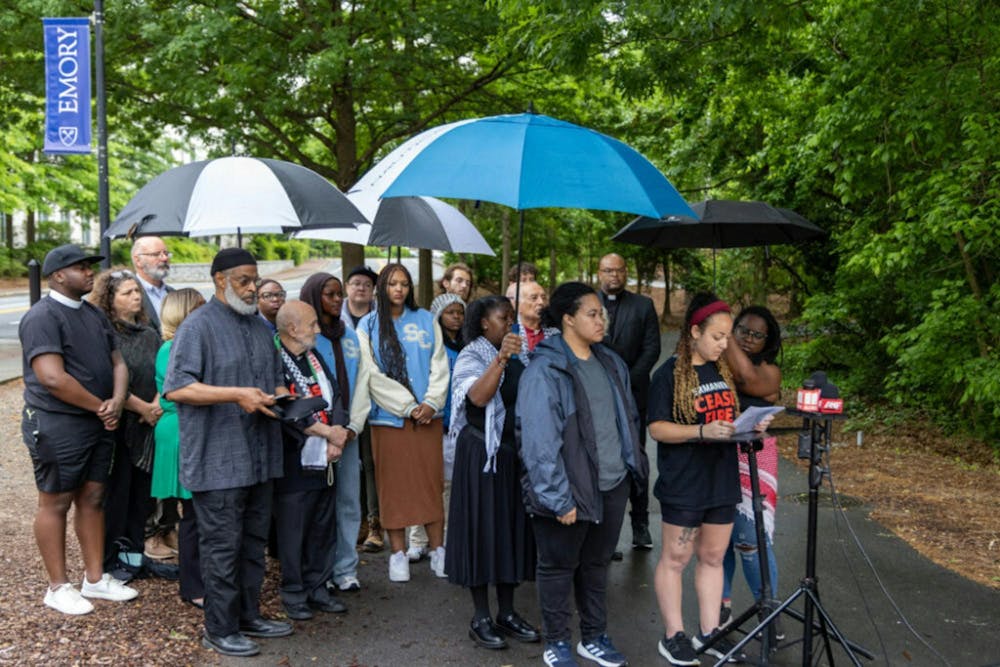Emory University has agreed to implement corrective measures to address discrimination after reaching an agreement on Jan. 16 with the Department of Education’s Office for Civil Rights (OCR) concerning anti-Muslim discrimination allegations. The agreement has left advocates and students mildly enthusiastic about the results, which addressed concerns but failed to determine whether Emory violated Title VI of the Civil Rights Act of 1964.
The Georgia chapter of the Council on American-Islamic Relations (CAIR-Georgia) and Palestine Legal filed a federal civil rights complaint on behalf of Emory Students for Justice in Palestine (ESJP) in April 2024. The complaint centered around alleged violations of Title VI, which bars programs that receive federal financial assistance from discriminating based on race, color and national origin.
ESJP President Ibrahim, who requested to be identified by his first name due to safety concerns, said the complaint came after students submitted bias reports to the University after they had been harassed, doxxed and had their memorials vandalized.
“In concluding this process Emory voluntarily signed a resolution agreement outlining steps that the university agreed to take to clarify and improve its policies addressing discrimination,” Emory wrote in a statement published in Atlanta News First.
The statement added that the University does not "tolerate" discrimination toward individuals due of their national origin, race or color.
"This agreement with OCR solidifies important steps, many of which were already underway, to advance the support we provide to our students, faculty, and staff," the statement reads.
Ibrahim said the resolution is a step in the right direction in holding the administration and law enforcement accountable for their actions during last year’s protests.
“This definitely is a victory because it addresses the concerns that we had reported on, especially when it comes to the arrests that happened on the encampment during April 25,” Ibrahim said.
Ibrahim added that he was disappointed in the lack of student involvement during the process.
“My only complaint … with this resolution is that it did not take any student input,” Ibrahim said. “This complaint was filed by ESJP and a number of students, and this agreement was solely made between OCR and Emory. Our input was not taken at all.”
CAIR-Georgia Executive Director Azka Mahmood said the University had taken measures to avoid being cited for a Title VI violation. According to Mahmood, the OCR simply needed to organize some evidence before Emory cut their process short with the settlement.
“They did this by asking the OCR to go through a resolution process,” Mahmood said. “So the resolution itself, the letter that was sent to [University President Gregory Fenves], says that the University asked us to go into this agreement before we could conclude our investigation.”
Ibrahim agreed with this sentiment, saying he hoped for a more direct stance on whether or not Emory had violated Title VI, calling it “absurd” that OCR had reached a settlement before concluding the investigation.
“The University requested to resolve those allegations prior to OCR making a determination as to whether or not those allegations raised Title VI compliance concerns,” OCR wrote in a letter to Fenves.
OCR will monitor Emory’s compliance with certain measures to counter discrimination to “ensure the University does not engage in unlawful different treatment in violation of Title VI.” These include revising nondiscrimination policies, campus protesting policies and improving anti-discrimination training among faculty.
Emory Revolutionary Students Collective, which was formerly Emory Stop Cop City, member Elijah Brawner (26T) said that the issues presented by the complaint touch on the broader issue of anti-Muslim and other alleged biases within Emory’s administration, which Brawner described as “a long history of very strong discrimination.”
“There’s this historic injustice that needs to be addressed,” Brawner said. “But then in the modern day, they’ve come a long way, but there’s still places to go.”
These sentiments were also echoed by Mahmood, who attributed anti-Muslim discrimination to top officials at Emory and other institutions.
“A lot of universities and at Emory University in particular, the anti-Muslim sentiment is coming from the very top,” Mahmood said. “It’s the top leadership that’s setting the tone and the tenor of how the rest of the university then addresses these incidents and these complaints.”
Mahmood said she aims to continue combatting on-campus discrimination at Emory and elsewhere. She added that the resolution shows that universities, such as Emory, are not above the law.
Ibrahim, however, doesn’t feel that the Emory administration harbors conscious Islamophobia. Instead, he feels that anti-Muslim discrimination from Emory higher-ups is primarily driven by President Fenves’ concerns about anti-semitism on campus and unconscious biases.
“I believe that the majority of the administration is not consciously Islamophobic or anti-Arab, or any of that sentiment,” Ibrahim said. “I believe that it’s honestly mostly President Fenves. He’s stuck in this fearful state where he believes that any Muslim or Arab activism is somehow a threat to Jewish students on campus, which I think is very far-reaching and kind of implicates his own internal Islamophobia or Arab hate.”
Correction (1/23/2025 at 11:30 a.m.): A previous version of this article did not include part of Emory University's statement. The article has been updated to better reflect the University's response.










